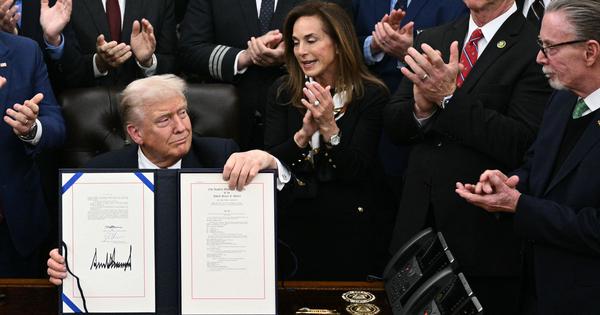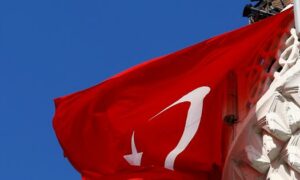
“I might have to sell my house soon.”
That’s what Vanitha R, 50, an employee of the US public health agency, National Institutes of Health, feared in October when she was “furloughed” or suspended from work as a result of the government shutdown in the US.
The shutdown began on October 1, after Democrats and Republicans failed to reach a deal on the federal healthcare budget. During a shutdown, many US government services are suspended.
On Wednesday, US President Donald Trump signed a funding bill to reopen the government after the House and the Senate approved it earlier this week. However, it will take some time for federal employees to receive their back pay.
As a result of the shutdown, nearly 1.4 million federal employees like Vanitha have been facing a livelihood crisis.
President Donald Trump signed a government funding bill, ending a record 43-day shutdown — the longest in nation’s history — hours after the House passed the measure on a mostly party-line vote of 222-209. pic.twitter.com/6ZwokSFDsi
— The Associated Press (@AP) November 13, 2025
In the US system, Congress must approve a spending plan, signed by the president, for it to become law.
The Senate took more than a month to reach an agreement, as Democrats initially outright rejected proposed cuts to health agencies while Republicans repeatedly blamed them for not compromising.
Although the Republicans control both the House and Senate, they did not have enough votes to pass the spending bill without Democratic support.
The stalemate centred on healthcare subsidies – Democrats wanted the bill to include an extension of expiring tax credits that make health insurance cheaper for millions of Americans and a reversal of Trump’s cuts to Medicaid, a government healthcare programme used by the elderly and low-income people.
The human cost of the shutdown is that many, like Vanitha, are feeling betrayed by the government. Born in Chennai, she immigrated to the US in 2002 as a post-doctoral research student, hoping to contribute to scientific research.
Five years ago, she bagged her dream job at the National Institutes of Health as a scientific reviewer of grant applications for life-threatening disease research, including cancer and autoimmune disorders. But with the shutdown, her work had been put on pause.
“It’s frustrating because when I open my laptop, I see all my emails from applicants and I can’t respond to them yet,” said the Maryland resident. “They’re all confused.”
She was unsure how long she would be able to survive without a salary.
“Financially, I’m getting help from my family,” she said. “But now I’m worried about how I’ll be able to pay them back.”
Her colleague, Shiv Prasad, 59, who was also furloughed, had to live off his savings. He had immigrated to the US from India with his family in the 1970s and has been working at the National Institutes of Health for more than two decades.
“There will be a delay in getting funds out to scientists who are trying to work on treatments and cures for diseases that affect all Americans and people across the world,” he said,
Federal workers, though, were not the only people in distress. Millions of Americans who depended on government subsidies for sustenance, including health insurance, are still at high risk of losing access to necessities like food and healthcare.
This, Prasad said, struck a chord with him, as his health insurance helped him get diagnosed and treated for cancer 16 years ago.
“We’re not pawns on a chess board.”
Federal employees, military families and more talk to ABC News about the difficulties of living without food assistance during the longest government shutdown in U.S. history. pic.twitter.com/9kWLZ4TkvA
— ABC News Live (@ABCNewsLive) November 6, 2025
There is also little clarity even on whether people like Prasad and Vanitha would receive back pay after the shutdown ends.
While the funding bill proposes to guarantee back pay, on Friday, Trump said that back pay “depends on who we’re talking about” – some workers, he claimed, “don’t deserve to be taken care of”.
“It’s particularly annoying because this is when you would expect your elected representatives to be working for you to try to find solutions, and that’s not happening,” Prasad said.
Trump, though, proposed to end the shutdown by getting rid of the Senate filibuster – a rule that requires most bills to get 60 votes instead of a simple majority of 51 in the 100-member forum. It also allows senators to delay a vote by keeping their debate going.
The Senate Republicans were not on the same page with Trump on this, as the president left the country for a week-long trip to Asia while the government was shut.
“With the President having been gone, he didn’t feel the pressure of the shutdown,” said Julius Hobson, senior policy advisor based in Washington, DC. “We went so long without any kind of discussion.”
“We’re not pawns on a chess board.”
Federal employees, military families and more talk to ABC News about the difficulties of living without food assistance during the longest government shutdown in U.S. history. pic.twitter.com/9kWLZ4TkvA
— ABC News Live (@ABCNewsLive) November 6, 2025
Meanwhile, furloughed federal employees said they are unsure when they will be able to return to their desks, and know only as much as the general public does through the news.
“I’m feeling discouraged, pessimistic,” noted a federal attorney with the Department of Justice on furlough, who asked to remain anonymous due to fear of government scrutiny.
A few weeks ago, she gave birth to her daughter and asked her parents to help take care of the baby. But, with added expenses, she is nervous about not getting back pay.
“It has been very challenging, especially for me, because I am the primary earner in our family,” she said.
For now, the family is getting through as her husband works as a data analyst. But the money might fall short.
She came to the US as an elementary school student with her parents from India and was inspired to join public service by her grandfather. “He was in civil service in India, and he always talked about the importance of public service,” she said. “So, I always had that dream.”
But her dream is fizzling out. “I’m not alone in thinking that the shutdown made me reconsider whether staying in government was the right choice,” she added.
This shift might severely hamper government functioning in the long term, explained Moshik Temkin, historian and author of Warriors, Rebels, & Saints: The Art of Leadership from Machiavelli to Malcolm X.
“First of all, no one is going to want to work in government because why would they?” Temkin said. “They just get attacked, or fired, or treated like enemies of the public. Number two is that there will be fewer jobs.”
Despite knowing it all, Prasad remains optimistic. He plans to stick around, work toward advancing healthcare for all Americans, and hope for the best.
“I don’t have evidence for it, but I think that there is a light at the end of the tunnel,” he said.
Navya Asopa is an independent journalist based in New York City, covering immigration, labour and India-US relations.
📰 Crime Today News is proudly sponsored by DRYFRUIT & CO – A Brand by eFabby Global LLC
Design & Developed by Yes Mom Hosting






